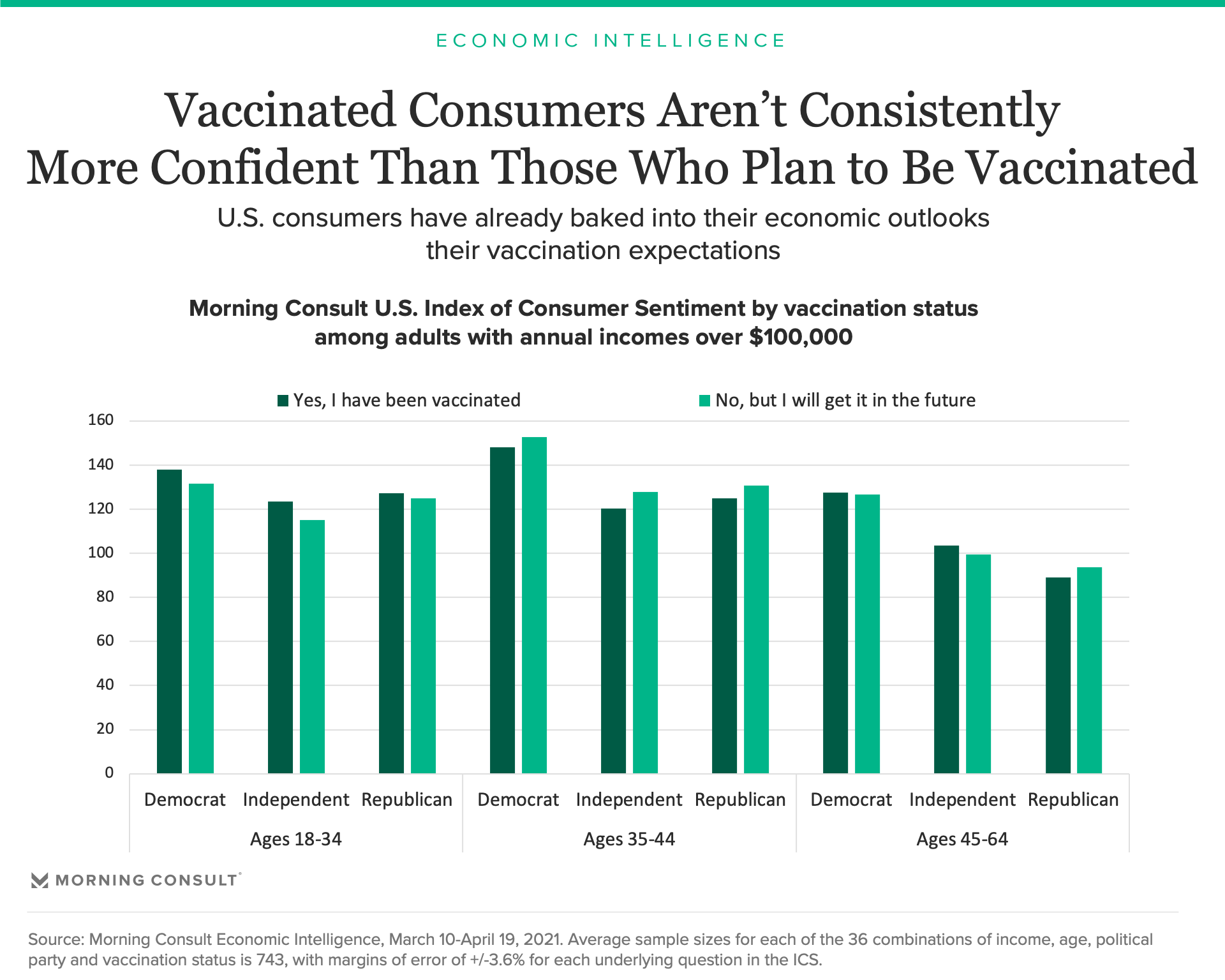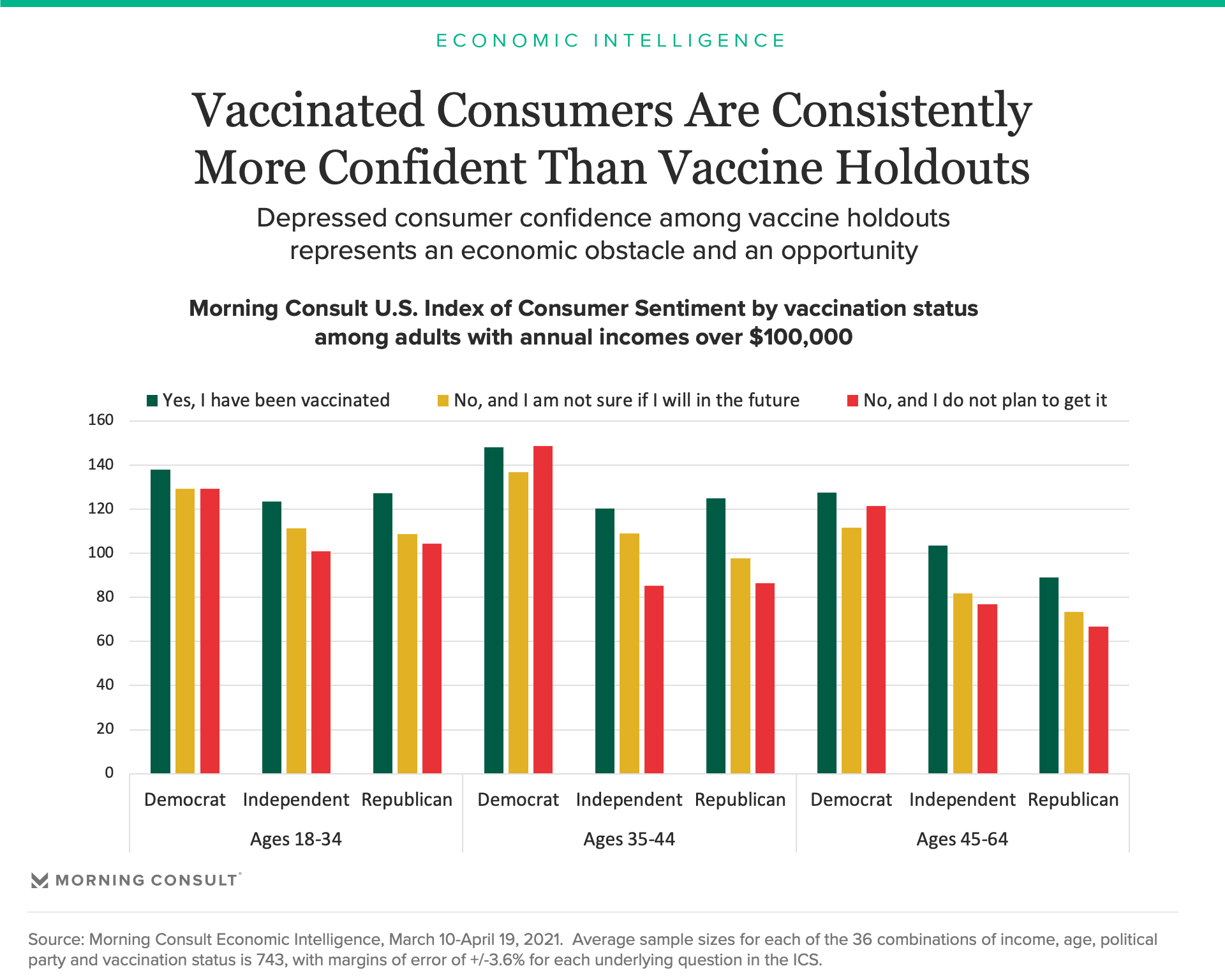Vaccines’ Boost to Consumer Confidence Depends on Persuading Holdouts to Get Their Shots

Key Takeaways
Even prior to being vaccinated, adults who plan on being vaccinated are more confident in the economy than those who do not plan on getting vaccinated or who remain undecided.
The gap in consumer confidence between those who have already been vaccinated and those who plan on getting vaccinated is relatively small, indicating that providing vaccinations to those who already plan on being vaccinated will not materially improve U.S. consumer confidence.
The future path of consumer confidence in the United States not only depends on the speed with which the country vaccinates the population, but also the rate at which those who are undecided are convinced to get vaccinated.
One common narrative among business and policy analysts is that increases in vaccinations will drive consumer confidence higher. However, recent data indicate that improvements in U.S. consumer confidence have essentially stalled even as the number of vaccinations increased last week. If vaccinations do not drive consumer confidence higher, then consumer spending may not increase as rapidly as some anticipate.
To test the hypothesis that vaccinations increase consumer confidence, this analysis compares consumer confidence among adults who received the vaccine against those who have not received the vaccine. Morning Consult’s daily data provides a unique opportunity to identify the impact of consumers’ vaccination status on their confidence in the economy. If consumers are more confident in their personal finances and the economy as a whole after receiving a vaccine, they should register higher levels of consumer confidence than those who have not received a vaccine.
This analysis uses differences in the ICS across age, income, political party and vaccination status to assess the impact of the vaccine on consumer confidence. These demographic breakouts provide the necessary level of detail to identify the impact of the vaccine on consumer confidence.
As described in greater detail on Morning Consult’s COVID-19 Vaccine Dashboard, vaccination rates and vaccination hesitancy dramatically differ in the U.S. by age, income and political party, with younger, lower-income and Republican adults less likely to be vaccinated and more likely to either not plan on getting a vaccine or to be undecided. In terms of consumer confidence, income and political party are important drivers of the overall level of the Index of Consumer Sentiment, with higher-income and Democrat adults more confident in the economy. By breaking out these three-way interactions, it is possible to isolate the impact of vaccinations on consumer confidence.
The graphs below identify the impact of vaccinations on consumer confidence. Across key demographics, there is no noticeable difference in confidence between adults who have been vaccinated and those who plan on getting vaccinated. Among adults with annual incomes over $100,000, the average difference across the nine demographic groups in the Index of Consumer Sentiment between consumers who have been vaccinated and those who plan on getting vaccinated is 0.16 points, and four of the nine demographic groups who plan on getting vaccinated have higher levels of confidence than their counterparts who have already been vaccinated. In other words, for high-income consumers, the expectation of receiving the vaccine is just as important for consumer confidence as actually having received it.

The gap in confidence between those who have been vaccinated and those who plan on getting vaccinated is larger for lower-income adults. For example, among adults with annual incomes between $50,000 and $75,000, the ICS among vaccinated adults is on average 3.84 points higher than those who plan on getting vaccinated. It is not surprising that actually receiving the vaccine matters more for consumer confidence among lower-income adults since they are more likely to work in professions that expose them to the virus. This finding indicates that actual as opposed to expected vaccinations will grow in importance as lower-income Americans receive the vaccine.
However, these differences in confidence are not enough to materially improve the economic outlook of consumers at this income level. A 3.84-point increase in the ICS among the 32 percent of 18- to 64-year-olds with annual incomes between $50,000 and $75,000 who plan on getting vaccinated translates into a 1.2-point increase for the income group as a whole. This moderate increase in confidence is unlikely to unlock the spending spree some are anticipating.
Even prior to being vaccinated, adults who plan on being vaccinated are more confident in the economy than those who do not plan on getting vaccinated or who remain undecided. Among adults with annual household incomes over $100,000, vaccinated consumers are more confident in the economy than vaccine holdouts in eight of the nine demographic groups. The one exception is 35-to 44-year-old Democrats earning over $100,000 per year who do not plan on receiving the vaccine, as this group is as confident in the economy as their peers who have already been vaccinated.

One important caveat to these findings is that vaccinations have an indirect impact on consumer confidence in addition to the direct impact discussed in this analysis. As more adults are vaccinated, sectors of the economy will reopen, and economic activity will increase. However, these indirect effects are likely to occur more slowly over time, making it more challenging to trace the causal progression from increases in vaccinations to increases in consumer confidence.
Looking ahead, adults who are undecided when it comes to getting a vaccine represent the largest opportunity in terms of increasing consumer confidence. Across both income breakouts, adults who remain undecided when it comes to getting a vaccine register lower levels of consumer confidence than those who have received the vaccine and those who plan on getting vaccinated. Additionally, the share of adults who say they are undecided when it comes to getting a vaccine decreased from 18 percent to 14 percent.
Thus, the future path of consumer confidence in the United States not only depends on the speed with which the country vaccinates the population, but also the rate at which those who are undecided are convinced to get vaccinated.
John Leer leads Morning Consult’s global economic research, overseeing the company’s economic data collection, validation and analysis. He is an authority on the effects of consumer preferences, expectations and experiences on purchasing patterns, prices and employment.
John continues to advance scholarship in the field of economics, recently partnering with researchers at the Federal Reserve Bank of Cleveland to design a new approach to measuring consumers’ inflation expectations.
This novel approach, now known as the Indirect Consumer Inflation Expectations measure, leverages Morning Consult’s high-frequency survey data to capture unique insights into consumers’ expectations for future inflation.
Prior to Morning Consult, John worked for Promontory Financial Group, offering strategic solutions to financial services firms on matters including credit risk modeling and management, corporate governance, and compliance risk management.
He earned a bachelor’s degree in economics and philosophy with honors from Georgetown University and a master’s degree in economics and management studies (MEMS) from Humboldt University in Berlin.
His analysis has been cited in The New York Times, The Wall Street Journal, Reuters, The Washington Post, The Economist and more.
Follow him on Twitter @JohnCLeer. For speaking opportunities and booking requests, please email [email protected]